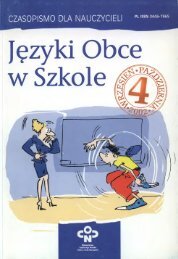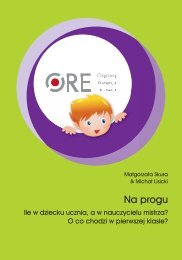PrzeglÄ daj publikacjÄ - Biblioteka Cyfrowa OÅrodka Rozwoju Edukacji
PrzeglÄ daj publikacjÄ - Biblioteka Cyfrowa OÅrodka Rozwoju Edukacji
PrzeglÄ daj publikacjÄ - Biblioteka Cyfrowa OÅrodka Rozwoju Edukacji
You also want an ePaper? Increase the reach of your titles
YUMPU automatically turns print PDFs into web optimized ePapers that Google loves.
Questions to the text:<br />
1. What is the cinema like?<br />
2. Why is going to the cinema such a happy event<br />
for the children?<br />
Questions to discuss:<br />
1. Do you remember going to the cinema as a child?<br />
What films did you watch?<br />
2. What is your earliest memory?<br />
Testing questions:<br />
Decide whether the statements are true or false.<br />
1. The father allows the children to watch nakedness<br />
in films.<br />
2. The lobby is upstairs.<br />
3. The best way to spend a quarter is to buy some<br />
sweets.<br />
4. Pedro Infante is a film director.<br />
5. Kiki must be watched at all times.<br />
6. The children who watch films often burst in<br />
tears.<br />
7. The children like eating popcorn in the cinema.<br />
8. Falling asleep in the cinema is pleasant.<br />
Vocabulary work:<br />
1. Find vocabulary used to describe the elements<br />
of interior decoration in the cinema.<br />
2. Find expressions used to describe what can be<br />
done with popcorn.<br />
Key:<br />
Questions to the text: 1. smelly, there are rats, children<br />
are allowed to watch all films, whole families go there,<br />
relaxing atmosphere, children can play in the aisle, people<br />
can talk loudly and eat, the shows last for many<br />
hours 2. they are allowed to buy sweets, run without<br />
parents’ control and play, when they are tired, they<br />
can fall asleep on the chairs and they are carried to<br />
the car and then home, the whole family spend time<br />
together, the children can enjoy themselves, they feel<br />
they are loved.<br />
Testing questions: 1F, 2F, 3T, 4F, 5T, 6F, 7F, 9T<br />
Vocabulary work: 1. thick carpet, velvet curtain, yellow<br />
fringe, candy counter, aisle, stage, screen, 2. toss in the<br />
air, grab big bunches, squish into tiny crumpled piles,<br />
squeak against teeth, bite the kernels, spit.<br />
2 Never marry a Mexican<br />
Never marry a Mexican, my ma said once and<br />
always. She said this because of my father. She said<br />
this though she was Mexican too. But she was born<br />
here in the U.S., and he was born there, and it’s not<br />
the same, you know. […]<br />
Mexican men, forget it. For a long time the men<br />
clearing off the tables or chopping meat behind the<br />
butcher counter or driving the bus I rode to school<br />
every day, those weren’t men. Not men I considered<br />
as potential lovers. Mexican, Puerto Rican, Cuban,<br />
Chilean, Colombian, Panamanian, Salvadorean, Bolivian,<br />
Honduran, Argentine, Dominican, Venezuelan,<br />
Guatemalan, Ecuadorean, Nicaraguan, Peruvian,<br />
Costa Rican, Paraguayan, Uruguayan, I don’t care. I<br />
never saw them. My mother did this to me.<br />
I guess she did it to spare me and Ximena the pain<br />
she went through. Having married a Mexican man<br />
at seventeen. Having had to put up with all the grief<br />
a Mexican family can put on a girl because she was<br />
from el otro lado, the other side, and my father had<br />
married down by marrying her. If he had married a<br />
white woman from el otro lado, that would’ve been<br />
different. That would’ve been marrying up, even if<br />
the white girl was poor. But what could be more ridiculous<br />
than a Mexican girl who couldn’t even speak<br />
Spanish, who didn’t know enough to set a separate<br />
plate for each course at dinner, nor how to fold cloth<br />
napkins, nor how to set the silverware.<br />
In my ma’s house the plates were always stacked<br />
in the center of the table, the knives and forks and<br />
spoons standing in a jar, help yourself. All the dishes<br />
chipped or cracked and nothing matched. And no<br />
tablecloth, ever. And newspapers set on the table<br />
whenever my grandpa sliced watermelons, and how<br />
embarrassed she would be when her boyfriend, my<br />
father, would come over and there were newspapers<br />
all over the kitchen floor and table. And my<br />
grandpa, big hardworking Mexican man, saying<br />
Come, come and eat, and slicing a big wedge of<br />
those dark green watermelons, a big slice, he wasn’t<br />
stingy with food. Never, even during the Depression.<br />
Come, come and eat, to whoever came knocking<br />
on the back door. Hobos sitting at the dinner table<br />
and the children staring and staring. Because<br />
my grandfather always made sure they never went<br />
without. Flour and rice, by the barrel and by the<br />
sack. Potatoes. Big bags of pinto beans. And watermelons,<br />
bought three or four at a time, rolled<br />
under his bed and brought out when you least expected.<br />
My grandpa had survived three wars, one<br />
Mexican, two American, and he knew what living<br />
without meant. He knew.<br />
My father, on the other hand, did not. True, when<br />
he first came to this country he had worked shelling<br />
clams, washing dishes, planting hedges, sat on the<br />
back of the bus in Little Rock and had the bus driver<br />
shout, You-sit up here, and my father had shrugged<br />
sheepishly and said, No speak English.<br />
150
















